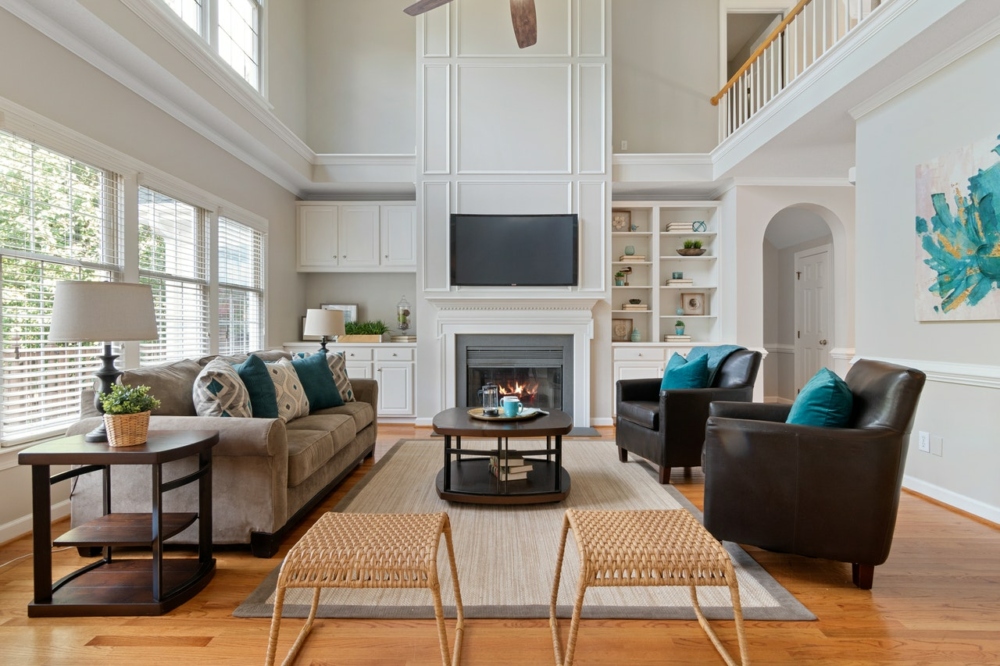Making changes to your home can have a direct impact on your health. No, we’re not talking about building an entire home gym. On the contrary, even small improvements to your home can have long-term consequences for you and your family’s health.
In “your” space, you can relax and recharge after a hard day. But if you choose the wrong architectural design, lighting or wall colour, the family nest can turn into a place where fatigue does not go away, but only accumulates. How can you avoid this?
Clean home = healthy family
Clearing the clutter is a key factor in your feeling of happiness and well-being, a factor that you simply didn’t realise. Tidying up can be painful at first, but it should help you overcome this important obstacle to joy in life.
1. Feeling unwell in your home
Living in disorder prevents you from identifying with your home. But the house should be a refuge from the turmoil of the outside world and a place that you can be proud of. Too many things in a small space make it feel like your home is your enemy and not your friend.
2. Unhealthy Eating
A 2017 Australian-American study found that people consume more cookies and sweets when the environment is chaotic. When the experimental kitchen was littered with rubbish, the study participants recorded reduced self-control. They ate twice as many cookies as in a standard kitchen, which is in relative order. In other words, you are more attracted to sweets in a cluttered environment because you have less control over yourself.
3. Another stress is the workplace
Scientists began to study stress 100 years ago. Picking up scientific archives, researchers at the University of Southern California found that in early studies of stress, a comfortable workplace environment was found to be an important factor in “mental hygiene.” Recently, researchers are more interested in mental comfort than physical comfort and can be considered proven: the workplace should be as free of junk as the apartment. It has long been known that employees can personalise their environment, as the comfort in the workplace significantly reduces stress. However, as the desktop becomes cluttered, this positive return diminishes. Since a lot of people work from home nowadays, make sure that your home workplace is clean and tidy.
4. We do not hear our partner, because we do not see his feelings.
The effectiveness of communication decreases sharply when your visual environment is filled with random stimuli. In their study of the effect of clutter on the perception of scenes in motion pictures, James Retting and Casey Armstrong of Cornell University (2016) found that when the background of a scene is heavily cluttered, viewers have a harder time interpreting the expression of emotion on their faces. If this is true for everyday life, then it turns out: you will less understand the feelings of the interlocutor if you see him against the background of the disorder.
5. Disorders of thought activity
“Mental disorder” is a state of mind in which you cannot suppress irrelevant information. Lynn Hasher of the University of Toronto suggested that mental confusion is one of the main causes of age-related memory loss. Her recent research supports this hypothesis. If you can’t cut through the old stuff cluttering your neural networks, you will be slower and less efficient in processing current information. As a result, you will be completely incapacitated when it comes to short-term memory tasks.
Start filling your trashcan right now, whether virtual or physical, and very soon your surroundings will become comfortable, and your thinking will be efficient and orderly.
Light and space
The space of the apartment should be bright and spacious. This can be achieved by making the right decisions at the design stage. There is only one rule: the more natural light, the better, therefore windows are very important – their size and location. The ideal option is huge floor-to-ceiling windows. If you prefer to hide your life from prying eyes, try to use light, diffusing curtains when decorating windows.
Instead of ordinary glasses, you can use the popular multi-functional ones or mirror glasses. They do not let the summer heat into the room, prevent heat loss in the cold season, and also help to save on electricity bills and to use air conditioners less often.
Light that disrupts your circadian rhythm
It’s no secret that if your bedroom is in direct sunlight during sunrise, you may wake up earlier than expected on Sunday morning. In addition to limiting much-needed rest, the light in your home can also affect your natural circadian rhythm.
In the early morning, light is ahead of your natural hours, making you feel that it is later in the day than it actually is. Conversely, that light can slow down your natural clock and make it difficult to fall asleep.
For those who are light sleepers or work at extraordinary hours, sunlight entering your room can be more than just an annoyance, causing loss of sleep or poor sleep. Blackout curtains and drapes can be of some help, but another, less intrusive option is honeycomb blinds or curtains between glass panes. You can find them at Marlow and Finch. Poor sleepers should consider this option when purchasing replacement windows in areas where there is too much natural light at the beginning and end of the day.
Colour spectrum
A house designed in dark colours may seem quite stylish, but it will be difficult to live in such a “gloomy space”, and most likely, you will not be able to relax at all. Dark tones cause anxiety and tension, and contribute to the development of depression. It becomes especially painful in a room where such shades prevail.
Bright and catchy colours are also not suitable: for example, red and purple provoke action. They are good for a club or gym, but housing is a very different space. It should be quiet at home.
Ideally, the walls should be light or pastel: beige, yellowish or powder colours. Green has a beneficial effect on our psyche, and white and cream shades add tenderness and romance. They are not annoying and help you to relax.
Toxic materials
From lead paint to potentially toxic cleaning products, figuring out what chemicals are in your home and getting rid of unwanted ones can have both short and long term health benefits. Small exposure to lead can potentially have adverse health effects on young children.
The best material for a house is wood. Such walls “breathe” and help clean the incoming air, trapping harmful particles. Due to its low thermal conductivity, a log or timber can effectively save heat, much better than concrete and brick. Another plus is the scent of the tree. Thanks to it, you feel calm and relaxed in the house.
Silence and comfort
A house can become a real place of power, but if we are talking about a high-rise building with high audibility and noisy neighbours behind the wall, it will be difficult to relax and unwind. When choosing, pay attention to the design and thickness of the walls: they must be multi-layer, at least 30 cm thick.
If you already live in an audible structure, try to find time and money to fix it. For example, you can add another layer of noise insulation.
When choosing housing, you should pay attention to how green the area is, whether there is a lot of free space and light in it.
You should not store unnecessary things in an apartment, and at the same time it is important to surround yourself with details that cheer you up. Then you will feel comfortable at home, and you will be able to fully rest and gain strength.
Purification of water and air
From asthma to protecting against germs, installing an air purification system in your home can have a number of benefits, especially in areas that are less than friendly to allergy sufferers. Not to mention, cleaning systems can also help get rid of unwanted odours in your home.
Plus, water purification systems can be a great way to improve your family’s health. These systems can help purify your tap water and reduce waste from plastic bottles.
Safety
Home can become a space for creativity and idea generation. If you work in an apartment, it’s worth setting up an ergonomic place to tune in and mobilise.
From a psychological point of view, the main thing in the house is safety. If we are constantly under the influence of toxic relationships and annoying colours, sharp corners and uncomfortable environments, this negatively affects our general condition.
Ask yourself questions: what is my home to me? What resources do I want to draw here? What am I missing now? The answers to them will be clues about which architectural and design solutions are right for you.
Conclusion
Since we’ve been spending more and more time inside lately, it only makes sense to make sure our homes have a positive impact on our overall health. Home gyms are great, but there are many other ways to improve the health of you and your family!







Recent Comments